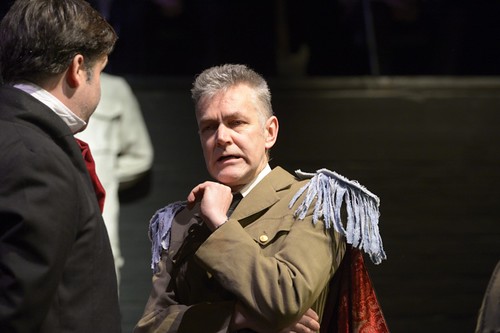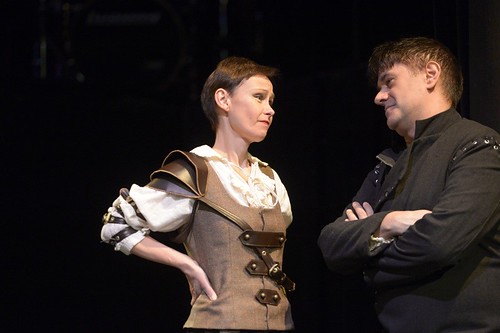Review – Julius Caesar
✭✭✭✩✩ Intriguing political drama
Adam House
Tue 26 – Sat 30 November 2013
Review by Hugh Simpson
Thought-provoking and challenging, Edinburgh Graduate Theatre Group’s Julius Caesar is an intriguing if ultimately somewhat uneven production.
There are certainly some modern resonances to Shakespeare’s story of the assassination of Caesar and its consequences, dealing as it does with the nature of power and how it is wielded.
The moral struggles of Brutus as he decides to throw his lot in with Cassius’s conspiracy in order to preserve the Rome he loves are more at the centre of the play than the character of Caesar, while the second half of the story is more about the conflict between Brutus and Mark Antony, the Roman ‘spin doctor’ who seeks to position himself as Caesar’s successor – a conflict which is fought out in the field of PR as much as the battlefield.
This production seeks to bring these modern parallels into sharp focus, but while it does this successfully, it could be accused of carrying things a little too far. Jacques Kerr’s brooding Brutus certainly conveys the inner struggle of the character, and is vocally extremely strong. However, he is permanently so downbeat and glum, and so often on the verge of tears, that he does not seem to be the dynamic potential leader others believe him to be.
David Grimes’s oleaginous Mark Antony, meanwhile, has a real stage presence, but is probably too convincing as a snake-oil salesman to be believable in the role. His delivery of the final lines about Brutus being the ‘noblest Roman of them all’ is so dripping with insincerity that it is impossible to take at face value. Richard Godden’s Caesar possibly also overdoes things just before his murder, appearing too much the deluded tyrant of the conspirators’ fears.
Elsewhere, the production eschews easy answers, preferring instead to pose questions. This is most notable in having a female Cassius, a hugely effective choice that forces the audience to re-evaluate the character’s motives and relationships. Helen Goldie is outstanding in the first half, giving the character a playful, almost mischievous air while also hinting at a hidden steel. Her energy levels drop a little in the second half, where the arguments between Cassius and Brutus descend into histrionics from both characters that render a proportion of the dialogue inaudible.
These once again stop the play from becoming safe
In an extremely capable 22-strong ensemble, there are some other interesting casting choices. There is a massive spread of ages, including some very young actors, who acquit themselves very well. Both Iain Goldie and Stuart Goldie seem natural performers, while Miriam Thomson, as Brutus’s servant Lucia, is one of the standout performances. There are contrasts in style, too, such as between Colin Thompson’s energetic, gurning Cinna the Conspirator and Brian Neill’s underplayed, hugely effective Decius. Such contrasts once again stop the play from becoming ‘safe’ and keep the audience questioning what they are seeing.
Claire Wood’s direction makes very good use of the large ensemble, handling crowd scenes with panache. The choreographed scenes of the murders of Caesar and Cinna the poet are sharp and to the point, while Steve Robb’s lighting design is effective and atmospheric. Chloe Whittaker’s costumes are well chosen, being drawn from a range of times and places, which helps to give the production a timeless feel, rather than being anchored in one era – something which is backed up by well chosen props. There is some inventive use of the auditorium; indeed, almost to excess – it is difficult not to ask some of the actors, standing in front of the stage, to stop blocking the view of the action.
The whole thing does begin to drag a little, however. This is one of Shakespeare’s plays that is most often cut, and often with good reason. Despite the uniformly high standard of acting, there could easily have been a couple of characters lost, and the second half could have done with some pruning. The live band who perform in between scenes are overused, moreover. There is no denying that they are a good idea in terms of atmosphere, and they are well-marshalled by music director Neil Colquhoun on guitar, but a few short pieces would have been far more effective. As it is, there are several full-length songs, which start to sound somewhat similar and some of whose lyrics seem less than profound.
Overall, this is a more than competent staging of an extremely difficult play, one which does not lend itself easily either to barnstorming performances or crowd-pleasing, sparkling displays. It is not too surprising, therefore, that it never really catches fire; however, it is intelligent, interesting and well worth seeing.
Running time 2 hours 50 minutes including interval
Run ends Saturday 30 November 2013
Evenings 7.30 pm
Adam House, 3 Chambers Street, Edinburgh EH1 1HR
Details at www.egtg.co.uk
Purchase tickets here: Grads’ online ticket purchase page
ENDS






















